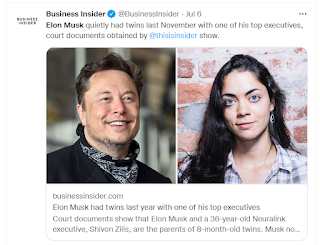I noticed that this tweet from Elon Musk:
Showed up just after this story:
I also see this pinned tweet:
It seems to me that this whole sorry saga misses several important points. Let us consider them.
One, the key to raising children is not being the sperm donor, which while a necessary step is far from a sufficient one. The real effort is the bearing of the children and taking the time to properly do tasks like childminding and educating children. One rich person having children with many women (Musk has 10 children by 3 different mothers) is not really doing much to address the fertility crisis.
Two, Earth reached a population of one billion people around 1804 CE. That is 218 years ago. Recorded history goes back to at least 3200 BCE. That means we had 5,000 years of successful human civilization with less than a billion humans. I think we can start getting worried about underpopulation when we hit one billion going the other way. Until then, I think concerns about whether there are enough people seem odd.
Finally, having children with a subordinate at work seems like a suboptimal decision. It is hard to ensure that there was a proper balance of power in the relationship. While the person in question, Shivon Zilis, seems to have a lot of agency in their career, it is always a concern in these cases.
So I would say that this strategy was not the optimal way to handle concerns about a population crisis. It might be fine for Musk and he likely has the resources to support this eccentricity, but I think that is what we need to call if it we are honest.
There are good pro-natalist policies that could be considered. My personal hint is that there is no way to understate the importance of childcare and that a positive childcare experience probably helps people match the number of children they prefer with the number of children they have. But I think these should be considered in the context of human happiness and not because we think we might be going extinct as a species.



David in Tokyo here.
ReplyDeleteWatching Japan, it seems that population distribution has a big effect on the apparent problematicity of population decline. Japan reached it's peak population in 2011 and it's population is expected to fall to about half it's current level in 2100. That would put it at a mid-1920s level, a period when Japan was doing just fine. This seems way worse than it is for three (distributional) reasons. The first is age. The Japanese population is now heavily and increasingly weighted to the elderly, with over 10,000 men and over 75,000 women over the age of 100. This is, of course, a superb achievement. But it freaks out the Japanese something fierce, since they worry about paying people's pensions. The second is geographical. Japan has been doing the urbanization thing frantically, and rural areas have been depopulating rapidly despite the until 2011 increasing population. Meaning that much of Japan is in a bad way fiscally. Our CEO grew up on an island with a population over 20,000 in 1970, but said population was well below 10,000 the last time we checked. Abandoned homes are consipucous throughout the island. (In reporting on the 2011 earthquake CNN called the affected regions "retirement communities". This was wrong because while the age distribution of the population in those areas was that of what US retirement communities are, the folks living there are all long-term residents who retired in place, and whose kids had moved to cities decades previously.) The third is financial. It turns out that Japan's affluent folks are producing kids at near or above replacement rates quite nicely, thank you. Japan's median income has been falling for the last 25 years, and many Japanese can't afford to date, let alone marry. So there isn't a depopulation problem at all amongst the well off, affluent, and rich.
This is the opposite of the line Elon is pushing. See today's post for ugly details.
Delete